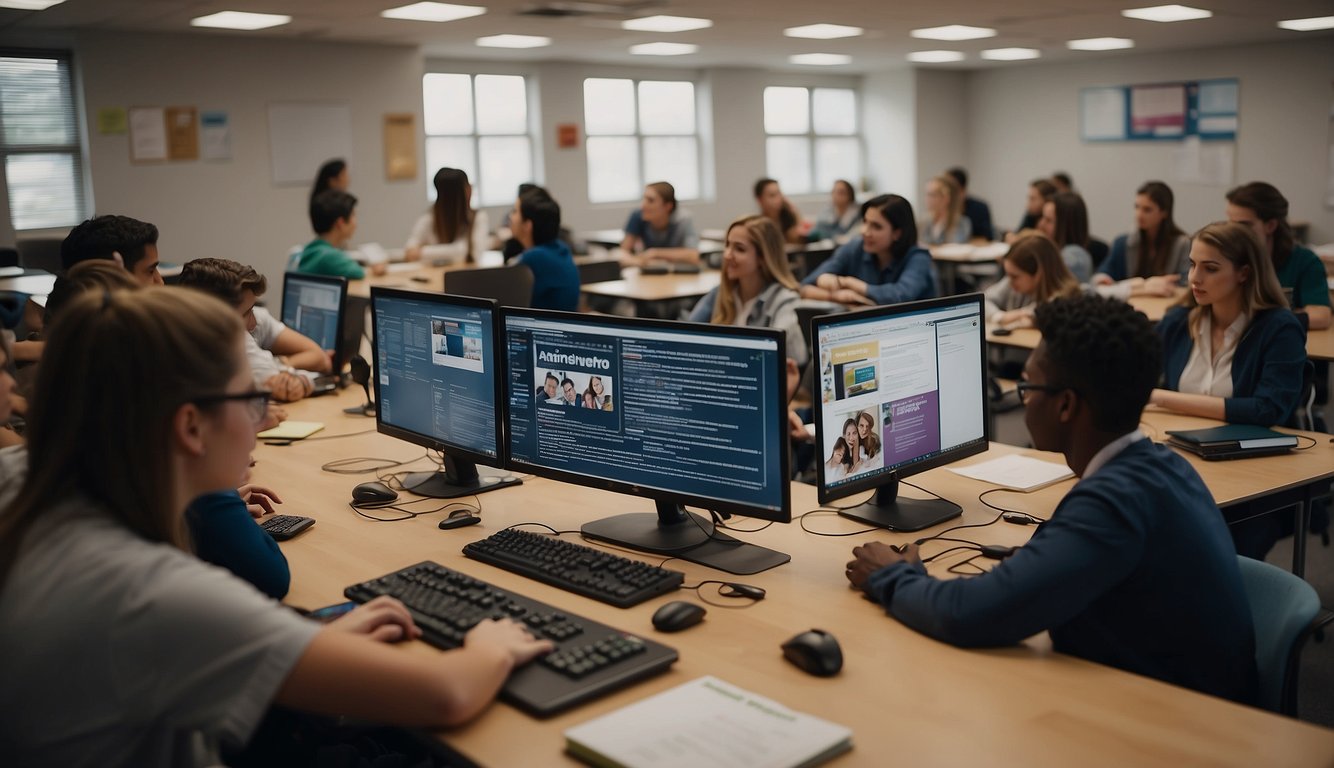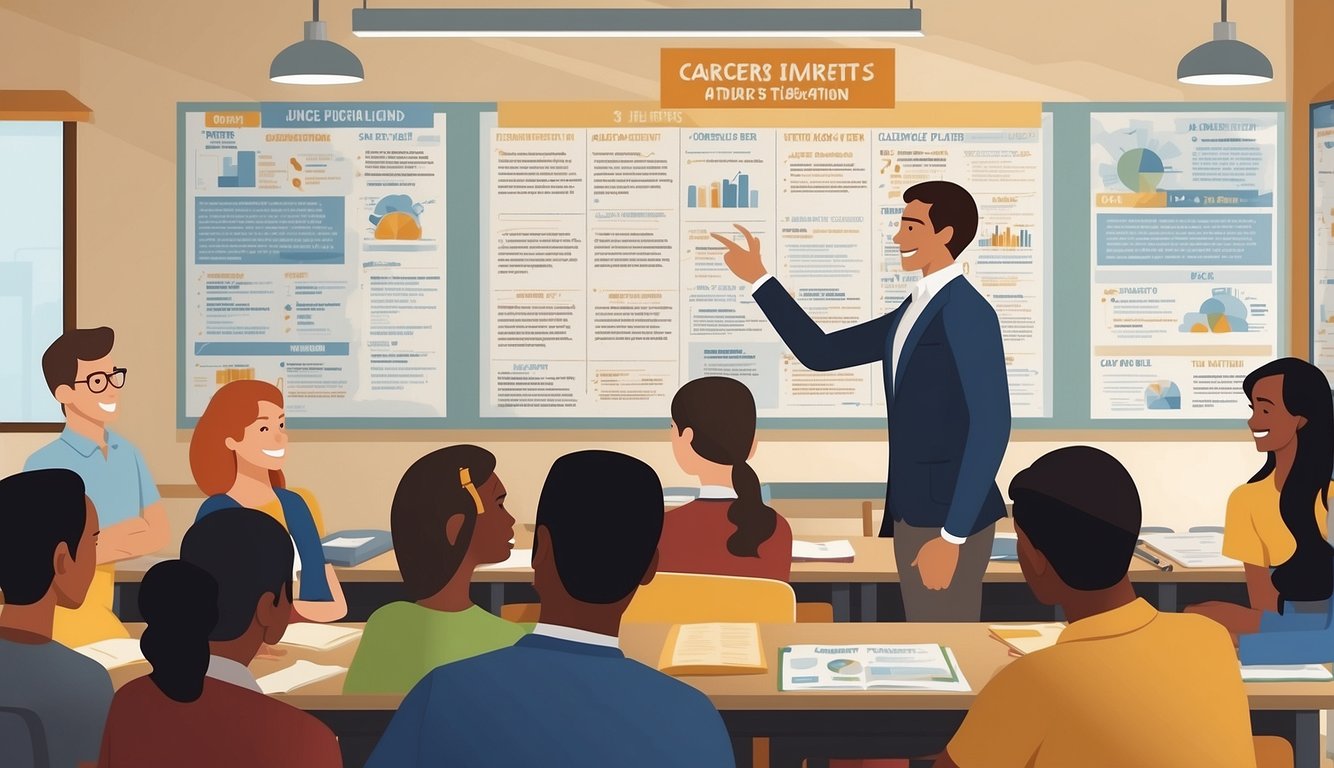If you are a secondary school student, you may be wondering what career path you should pursue. Choosing a career can be a daunting task, but with the proper guidance, you can make an informed decision that will set you on the path to success.
Career guidance is an essential component of secondary education, and it can help you identify your strengths, interests, and goals.
Career guidance programs are designed to help students explore different career options and make informed decisions about their future.
These programs provide students with information about various careers, including job duties, education requirements, and salary expectations. They also offer guidance on how to develop the skills and knowledge needed to succeed in a particular field.
With the help of career guidance, you can make a well-informed decision about your future and take steps to achieve your goals.
Table of contents
Understanding the Importance of Career Guidance

Career guidance is a vital aspect of education that helps students in secondary schools to identify and pursue their career goals.
It is a process that involves providing students with information, advice, and guidance to help them make informed decisions about their future careers. In this section, we will explore the benefits of early career planning and the impact of career guidance on future success.
Benefits of Early Career Planning
Early career planning is essential for students in secondary schools as it helps them to identify their interests, skills, and values.
This information is crucial in selecting a career path that aligns with their strengths and passions. When students have a clear understanding of their career goals, they are more motivated to work towards achieving them.
Early career planning also helps students to make informed decisions about the courses they take in high school and post-secondary education.
Impact of Career Guidance on Future Success
Career guidance has a significant impact on the future success of students. It helps students to understand the job market and the skills required for different careers.
This knowledge helps students to make informed decisions about their career paths and prepares them for the job market.
Career guidance also helps students to develop the skills and knowledge required for the workplace, such as communication, problem-solving, and teamwork.
Research shows that students who receive career guidance are more likely to complete high school, pursue post-secondary education, and secure employment. Career guidance also helps students to achieve higher levels of job satisfaction and career success.
In conclusion, career guidance is a critical aspect of education that helps students in secondary schools identify and pursue their career goals.
Early career planning and career guidance have numerous benefits, including helping students make informed decisions about their future careers and preparing them for the job market. With the proper career guidance, students can achieve higher levels of job satisfaction and career success.
Exploring Career Interests and Skills

As a secondary school student, it’s essential to explore your career interests and skills to help you make informed decisions about your future.
This section will provide you with some guidance on how to explore your interests and skills.
Self-Assessment Tools
Self-assessment tools are a great way to get started with exploring your career interests and skills. These tools can help you identify your strengths, weaknesses, interests, and values. Some popular self-assessment tools include:
- Career Key: This tool helps you identify your personality type and suggests careers that might be a good fit for you.
- Holland Code: This tool helps you identify your interests and suggests careers that match those interests.
- StrengthsFinder: This tool helps you identify your strengths and suggests ways to apply those strengths in your career.
Identifying Personal Strengths and Interests
Another way to explore your career interests and skills is to identify your strengths and interests. Here are some tips to help you get started:
- Make a list of your hobbies and interests. Think about the things you enjoy doing in your free time. Do any of these activities relate to potential careers?
- Identify your strengths. Think about the things you’re good at. Do any of these skills relate to potential careers?
- Talk to people in different careers. Ask them what they like and dislike about their jobs. This can help you get a better understanding of what different careers involve.
By exploring your career interests and skills, you can start to get a better idea of what you might want to do in the future. Remember, it’s essential to keep an open mind and be willing to try new things. Good luck on your career exploration journey!
Career Guidance Resources

As a secondary school student, there are a variety of resources available to help you explore potential career paths and make informed decisions about your future.
Here are two types of resources that can be especially helpful:
Online Platforms and Tools
Some online platforms and tools can help you research different careers, learn about job requirements and salaries, and even match your skills and interests to potential careers. Some popular options include:
- CareerOneStop: This website is sponsored by the U.S. Department of Labor and offers a range of resources for career exploration, including an interest assessment, skills assessment, and occupation profiles.
- MyNextMove: This tool, also sponsored by the Department of Labor, allows you to search for careers based on your interests and experience level. It also provides information about job outlook, salary, and required education.
- O*NET OnLine: This resource provides detailed information about different occupations, including skills required, work activities, and job outlook. It also includes a tool for exploring careers based on your skills and abilities.
Career Counseling Services in Schools
Many secondary schools offer career counselling services to help students explore their options and make informed decisions. These services can include:
- One-on-one counselling: You can meet with a counsellor to discuss your interests, skills, and goals and receive guidance on potential career paths.
- Career assessments: Some schools offer assessments that can help you identify your strengths and interests and match them to potential careers.
- Career fairs and events: Many schools host career fairs and other events where you can meet with professionals in different fields and learn about potential career paths.
Overall, there are many resources available to help you explore potential careers and make informed decisions about your future. By taking advantage of these resources, you can gain valuable insights and make a plan that aligns with your goals and interests.
Setting Career Goals

As a secondary school student, setting career goals is an essential step in achieving your desired career path. By setting career goals, you can focus your efforts on the skills and experiences you need to acquire to reach your desired career.
Short-Term vs Long-Term Goals
When setting career goals, it is essential to consider both short-term and long-term goals. Short-term goals are those that can be achieved within a few months to a year, while long-term goals may take several years to achieve.
Short-term goals can include things like improving your grades, gaining work experience through internships or volunteering, or developing specific skills such as public speaking or computer programming. Long-term goals may include obtaining a specific degree or certification, gaining experience in a particular industry, or starting your own business.
It is essential to have a balance between short-term and long-term goals. Short-term goals can help you stay motivated and focused on your career path, while long-term goals provide direction and a sense of purpose.
Creating an Action Plan
Once you have identified your career goals, it is essential to create an action plan to achieve them. An action plan should include specific steps that you need to take to achieve your goals, as well as a timeline for completing each step.
To create an action plan, start by breaking down your long-term goals into smaller, manageable steps. For example, if your long-term goal is to become a doctor, your short-term goals might include getting good grades in your science classes, volunteering at a hospital, and shadowing a doctor.
Next, create a timeline for completing each step. This will help you stay on track and ensure that you are making progress towards your goals. Be sure to set realistic deadlines for each step and adjust your timeline as needed.
By setting career goals and creating an action plan, you can take control of your future and work towards achieving your desired career path. Remember to stay focused, stay motivated, and stay committed to your goals.
Educational Pathways

Choosing the right educational pathway in secondary school is critical to your future career prospects. Your choice of subjects, vocational training, and apprenticeships can all have a significant impact on your career trajectory.
Here are some of the critical considerations when it comes to educational pathways.
Choosing the Right Subjects
Choosing the proper subjects is crucial to your future career prospects. It is important to choose subjects that align with your interests and career aspirations.
For example, if you are interested in pursuing a career in science, you should consider taking subjects such as physics, chemistry, and biology. Similarly, if you are interested in pursuing a career in business, you should consider taking subjects such as accounting, economics, and business studies.
It is also essential to consider the requirements for your chosen career. Some careers require specific subjects or qualifications, so it is essential to research the requirements for your chosen career and choose your subjects accordingly.
Vocational Training and Apprenticeships
Vocational training and apprenticeships are an excellent way to gain practical skills and experience in your chosen field. Vocational training courses are designed to provide you with the skills and knowledge you need to succeed in your chosen career. In contrast, apprenticeships provide you with on-the-job training and experience.
Vocational training courses and apprenticeships are available in a wide range of industries, including construction, healthcare, hospitality, and IT. They are an excellent way to gain practical skills and experience and can often lead to employment opportunities after you complete your training.
In conclusion, choosing the right educational pathway is critical to your future career prospects. By choosing the proper subjects and considering vocational training and apprenticeships, you can set yourself on the path to a successful and fulfilling career.
Work Experience Opportunities

As a secondary school student, gaining work experience can be a valuable way to learn about different careers and develop practical skills.
Here are two types of work experience opportunities that you can consider:
Internships and Volunteering
Internships and volunteering are excellent ways to gain experience in a particular field while also giving back to the community. Internships are usually paid or unpaid positions that allow you to work for a company or organization for a set period. At the same time, volunteering involves giving your time and skills for free.
Both internships and volunteering can give you hands-on experience in a specific field, such as healthcare, education, or the environment. They can also help you develop valuable skills such as communication, teamwork, and problem-solving.
Part-Time Jobs and Their Value
Part-time jobs are another way to gain valuable work experience while earning some money. Part-time jobs can be found in a variety of industries, such as retail, food service, and hospitality.
Working part-time can help you develop essential skills such as time management, customer service, and money management. It can also teach you the value of hard work and responsibility.
Overall, work experience opportunities can be a valuable way to explore different careers and develop practical skills. Consider internships, volunteering, and part-time jobs as ways to gain valuable experience and prepare for your future career.
Developing Essential Skills

As a student in secondary school, it is important to develop essential skills that will prepare you for success in your future career. Two essential skills that are particularly important are communication and interpersonal skills, as well as critical thinking and problem-solving.
Communication and Interpersonal Skills
Effective communication is essential in any career, and it is a skill that can be developed through practice. By learning how to express yourself clearly and listen actively, you will be able to communicate effectively with colleagues, clients, and customers.
Interpersonal skills are also necessary, as they allow you to build positive relationships with others. This includes skills such as empathy, teamwork, and conflict resolution. By developing these skills, you will be able to work effectively with others and achieve common goals.
Critical Thinking and Problem-Solving
Critical thinking and problem-solving skills are also essential for success in any career. These skills allow you to analyze information, evaluate options, and make informed decisions.
To develop your critical thinking and problem-solving skills, it is essential to practice asking questions, considering multiple perspectives, and evaluating evidence. By doing so, you will be able to approach problems logically and systematically and develop practical solutions.
In conclusion, developing essential skills such as communication and interpersonal skills, as well as critical thinking and problem-solving, is crucial for success in any career. By practicing and honing these skills, you will be well-prepared for the challenges and opportunities that lie ahead.
Navigating the Job Market

When it comes to finding a job, the process can seem overwhelming. However, with the proper knowledge and skills, you can navigate the job market with confidence. Here are some tips to help you get started.
Understanding Job Trends
It’s essential to understand the current job market and the trends that are shaping it. This can help you identify industries that are growing and in need of new talent. Some industries that are currently experiencing growth include healthcare, technology, and renewable energy.
In addition to understanding which industries are growing, it’s also important to research specific job roles that are in demand. This can help you tailor your skills and education to meet the needs of employers.
Networking and Building Professional Relationships
Networking and building professional relationships can be a critical factor in finding job opportunities. This can include attending job fairs, connecting with alums from your school, or reaching out to professionals in your desired industry.
It’s also essential to build a solid online presence, as many employers use social media and professional networking sites to find potential candidates. Make sure your online profiles are up-to-date and professional, and consider reaching out to professionals in your desired industry through these platforms.
By understanding job trends and building professional relationships, you can increase your chances of finding a fulfilling career after graduation.
Preparing for Higher Education

When it comes to preparing for higher education, there are several things you can do as a secondary school student to ensure you are ready for the next phase of your academic journey. Here are two essential things you should consider:
College Application Process
The college application process can be overwhelming, but it doesn’t have to be. To make the process easier, start by researching the colleges you are interested in attending. Look at their admission requirements, application deadlines, and any additional materials they may require, such as essays or letters of recommendation.
Once you have a list of colleges you want to apply to, create a timeline for completing your applications. This will help you stay organized and ensure you meet all of the deadlines. Be sure to give yourself plenty of time to complete each application and gather any necessary materials.
Scholarships and Financial Aid
Higher education can be costly, but there are several ways to reduce the financial burden. Scholarships and financial aid are two options that can help make college more affordable.
Start by researching scholarship opportunities. Many colleges and universities offer scholarships to incoming students based on academic merit, athletic ability, or other criteria. There are also many external scholarships available, which you can find through online databases or by contacting local organizations.
When it comes to financial aid, be sure to fill out the Free Application for Federal Student Aid (FAFSA). This will determine your eligibility for federal grants, loans, and work-study programs. You can also apply for state and institutional aid, which may be based on financial need or other factors.
By taking these steps, you can prepare yourself for a successful transition to higher education.
Transitioning from School to Work

After completing your secondary education, you may be wondering how to transition from school to work. This can be a challenging process, but with the proper guidance and preparation, you can successfully navigate this transition.
Resume Writing and Interview Techniques
One of the first steps in finding a job is creating a solid resume that highlights your skills and experiences. Your resume should be tailored to the specific job you are applying for and should include relevant information such as your education, work experience, and any relevant skills or certifications.
In addition to having a solid resume, it is essential to develop effective interview techniques. This includes researching the company and the position you are applying for, practising common interview questions, and dressing appropriately for the interview.
Job Search Strategies
When searching for a job, it is essential to use a variety of strategies to increase your chances of finding employment. This may include networking with professionals in your desired field, attending job fairs, and utilizing online job search websites.
In addition to these strategies, it is essential to stay organized and keep track of your job applications and any follow-up communications with potential employers. This can help you stay on top of your job search and ensure that you are following up appropriately.
Overall, transitioning from school to work can be a challenging process, but with the proper preparation and strategies, you can successfully navigate this transition and find a fulfilling career.
